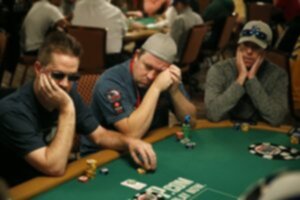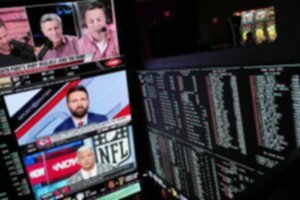Cheating in poker is about as old as the game itself. Unfortunately, in almost every game, it’s crossed the mind of someone how they can cheat the system. The good news is that if you play online or at a casino, you’re in great hands. Thanks to technology, it’s really hard to get away with anything.
However, if you’re playing private games, you better keep your eyes wide open. While most private games are played in good faith, some can feel more like the wild west. With that in mind, we’ve got several telltale signs to look out for in terms of potential cheating at the poker table.
Marked Cards Can Give Players An Unfair Edge
Card imperfections is one of the oldest tricks in the book. The question is did they happen innocently and naturally, or was there some type of malicious intent behind them?
The first thing to understand with marked cards is what they are. Of course, with a deck of cards, the idea is that you never know what cards are going to pop up. You use your skill and gaming to make projections but you don’t actually know what card will turnover. Now, let’s say that there is a mark on a card. Maybe it’s a magic marker that’s only visible to some players who know how to reveal that or maybe there’s a small tear or imperfection on a card. That way you’ll know if your opponent is holding royalty or an Ace, or if it’s at the top of the deck. This gives some players an advantage.
If you see something like a bent corner, immediately request a new deck altogether. The last thing you want is to be gamed based on someone doctoring up the cards. Keep an eye out for those imperfections because they can cost you.
Private Games Are More Susceptible To Cheating
If you’re worried about cheating, you might want to avoid private games.
In general, everyone loves a private poker game – especially if you’re skilled. That’s because you’ll probably have a good opportunity to school an inexperienced player. However, if you plan to play a few private poker games with close friends and family, you have to be aware that they are much more susceptible to cheating. The logic is quite simple: if you’re playing in a casino, you know that they are investing heavily into resources to make sure that there is no cheating.
To start, the dealer is a third party – not someone who is hosting the game in their house – and there are cameras everywhere. Also, cheating is punishable by law in those cases. However, if you’re playing in someone’s home, who’s to really keep an eye on the scamming? It could prove to be your word against someone else’s. And even if you do bust someone cheating, what’s to force them to comply?
These are all issues that you might encounter in private games. That’s not to say that all of them are unsafe; we’re always happy to be dealt into a private poker affair. However, these games are more vulnerable than the ones in a real money casino.
Be Diligent With Trades
One thing that happens at the poker table more so than you might think is trades or various agreements. These are not something you’ll really worry about at a casino or an officially-sanctioned tournament. There will be officials there to monitor the deals and enforce them for fairness if need be. The main concern with these is playing in private games.
If you plan to make trades of any kind – let’s say you’re putting in cash and someone else is using collateral – be very careful as to how these go down. You don’t want to be in a situation where you’ve hit ‘send’ in CashApp or Venmo, and the other person doesn’t fulfill their end of the bargain. Trades open you up to scams, so stay safe when you plan to work these types of swaps.
Don’t Loan Money To People You Don’t Trust
Loaning money to friends can sometimes turn those relationships sour if they don’t repay. An even worse idea is to loan money to friends or strangers at the poker table. If you’re losing your money that night, let it be because the cards didn’t go your way or you didn’t make great decisions. Don’t be separated from your money because you decided to lend it to someone who didn’t bring their own or was irresponsible with what they brought.

If the topic does come up, just tell people that it’s your principle that you never loan money. Feel free to make a phony situation in the past where you got burned as that will usually quell the questions. If not, guide them to the nearest bank or have them sit it out. It’s better they suffer a bit of discomfort for not joining in than you suffer the discomfort of having to chase someone down for a loan.
Consider Collusion
While this is one of the rarest occurrences in the poker world, collusion happens more often than you think. Just take a look back to small-stakes poker “incident” last year (we won’t name any names). One player appeared to be winning quite regularly in a casino, making decisions that didn’t quite make sense. The general thinking is that the player maybe had a mole inside the casino – or somewhere – tipping them off as to what move to make.
If it can be pulled off in a casino, it’s much easier to do in a private game at home. That’s where you really have to be careful. Keep in mind that collusion can come in many forms. Players might pretend not to know each other but maybe they’ve already worked out a scheme to hustle you. Or maybe there’s a plan – say, a hot babe – who is just there to distract you, read you or get you off your game while the others have paid her to do exactly that. You really have to have your wits about you as these types of schemes happen more than you might think in private games.
Hidden Chips
There is a rule in poker that states that your higher denomination chips have to be clearly visible to the other players at the table. This exact situation made headlines after Alec Torelli had covered up his chips from a few players at the table. Another player ended up getting confused about the number of chips he actually had, so he panicked and went all in. This is a form of deception that was no accident. The best poker players are always trying to read their opponents in every which way – including what their stack is at – so if you can throw them off a bit, that’s a big benefit.
It’s hard to track this type of thing in a private poker game but it’s something you’ll worry about much less in a casino. At a casino, there are others around – including cameras – that will help monitor the situation and prevent any type of deception from taking place. In a private game, it’s a free for all, so don’t be surprised if players try to use this technique or anything else that might give them a leg up. After all, there are no real repercussions even if they get caught.





